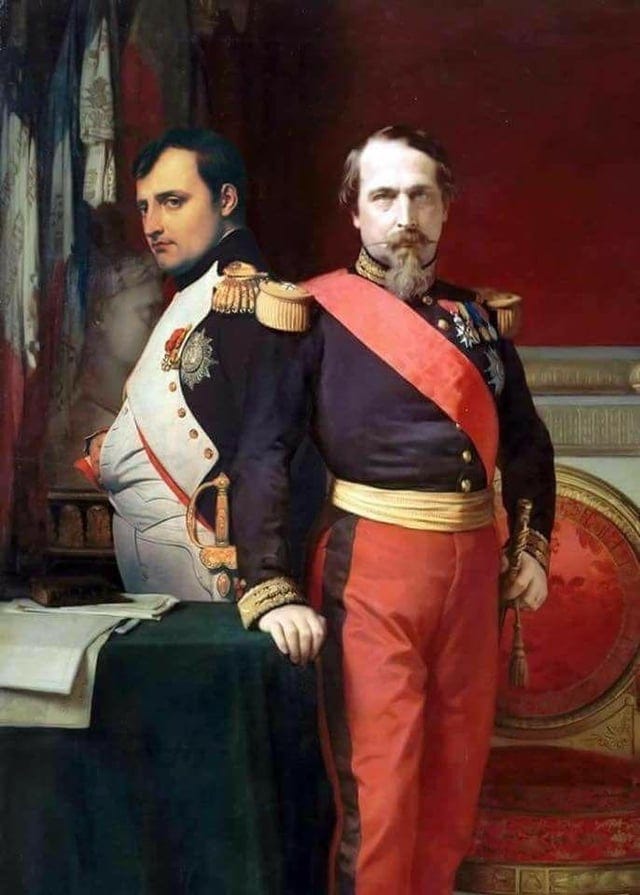I’ve been making a translation of Hugo’s epic Les Châtiments (1853): his monumental, immensely extended poem of vitriolic hatred for Napoleon III. Here I talk about my project:
Les Châtiments means something more forceful than the English ‘chastisements’, although that is what is going on in this poem: Victor Hugo is chastising Napoleon III. Driven out of France by Louis Napoleon’s coup d’état of 2 December 1851, Hugo relocated to the Channel Islands (the nearest he could get to France without actually being in France) and poured out his fury and scorn and detestation of ‘Napoleon the Little’ in a great stream of accusatory poems — châtiments from châtier, which means: ‘to punish, to castigate, to flog’. In short order he had an epic-length volume: seven long books, 95 constituent poems, some shorter, some much more substantial. Hugo loathed Napoleon III, considered him a violent liar, oppressor of the poor, betrayer of France, and a pathetic mockery of his illustrious uncle, Napoleon Bonaparte. The resulting work is perhaps the most extraordinary, sustained work of pure scorn and loathing ever written: a masterpiece of hatred, by turns satirical, mocking, outraged, heartbroken and earnestly deploring — though never despairing. The seven books of the epic, after a preliminary section titled ‘Nox’, ironically repurpose the boasts Louis Napoleon made upon seizing power for their titles: Book 1: ‘Society is Saved!’ Book 2: ‘Order is Re-established!’ Book 3: ‘The Family is Restored!’ Book 4: ‘Religion is Glorified!’ Book 5: ‘Authority is Sacralised!’ Book 6: ‘Stability is Assured!’ — then, finally, Book 7: ‘The Saviours Save Themselves’. An epilogue, ‘Lux’, looks forward to a world free of Napoleon’s tyranny.
I’m up to Book 7 now, and will soon, d.v., finish: whereupon I’ll start to look for a publisher—though it’s one of the most important epic poems of the nineteenth-century it has, astonishingly, never before been translated into English. In terms of translation, the constraints I have put upon myself are: to translate line by line (not to paraphrase, or move elements in the poetry around), and to reproduce in English Hugo’s rhyme scheme. This latter is proving quite the challenge, I must say. Words rhyme easily in French: not so easily as they do in Italian, but much more so than is the case in English. The poem itself divides between sections in rhymed couplets (examples of my renderings of some of those: here and here) and sections in various lyric modes (a prior example of that here). These are harder to translate, and yesterday I tackled perhaps the hardest I’ve yet come across: Châtiments 7.6, a five-stanza lyric contrasting the majesty and tragic fall of Napoleon Bonaparte, ‘Napoleon the Great’, with the venal corruption and wickedness of his nephew, Napoleon III, whom Hugo calls ‘Napoleon le Petit’. How to reproduce in English the rhyme of the last line of each stanza?
VII. Les sauveurs se sauveront 6: Chanson Sa grandeur éblouit l’histoire. Quinze ans, il fut Le dieu que traînait la victoire Sur un affût ; L’Europe sous sa loi guerrière Se débattit. — Toi, son singe, marche derrière Petit, petit. Napoléon dans la bataille, Grave et serein, Guidait à travers la mitraille L’aigle d’airain. Il entra sur le pont d’Arcole, Il en sortit. — Voici de l’or, viens, pille et vole, Petit, petit. Berlin, Vienne, étaient ses maîtresses ; Il les forçait, Leste, et prenant les forteresses le corset ; Il triompha de cent bastilles Qu’il investit. — Voici pour toi, voici des filles, Petit, petit. Il passait les monts et les plaines, Tenant en main La palme, la foudre, et les rênes Du genre humain ; Il était ivre de sa gloire Qui retentit. — Voici du sang, accours, viens boire, Petit, petit. Quand il tomba, lâchant le monde, L’immense mer Ouvrit à sa chute profonde Son gouffre amer ; Il y plongea, sinistre archange, Et s’engloutit. — Toi, tu te noieras dans la fange, Petit, petit. Jersey, septembre 1853
.
His greatness dazzles history.
Fifteen years, he is
A god, hauled-on by victory
On gun-carriages
Europe, beneath his warlike mind,
Strained to settle. —
You, his monkey, march behind:
Little, little.
Napoleon on the battlefield,
Serene, regal,
Manoeuvred through the cannons’ yield
The bronze eagle.
He crossed the bridge at Arcola,
He passed all. —
Here's gold, come: steal some plunder,
Little, little.
Berlin, Vienna, his mistresses;
He who forced it
And who seized those fortresses
By the corset;
He triumphed at a hundred forts
Siege committal. —
For you: here are some girly whores,
Little, little.
He crossed the mountains and the plains,
Holding in hand
The palm, the thunderbolt, the reins
Of humankind;
Drunk upon his glory’s resolve
Showing his mettle. —
Here's blood: come quickly now and quaff,
Little, little.
When he fell, letting go of all,
The enormous sea
Opened to his profound fall
Its salt vacancy
He, sinister archangel, plunged
Swallowed total. —
You, you’ll drown in the mire’s gunge,
Little, little.
Little rhymes with ‘little’, but I went with that word anyway, having experimented with ‘Petty’ and ‘Small’ and not found them satisfactory to the task. I did wonder if I should have pointed out 'Petit' as more of a title than simply a height-description ('Little One', 'Mr Little' or something) but decided against it. I quite like the plunged/gunge rhyme at the end. And I feel my version perhaps captures the forceful scorn of Hugo addressing the Emperor of all the French as 'little, little'.More on Hugo’s poem when I’m finished translating it.





I understand your difficulty in translating petit, petit, but in French you don't need a noun (eg mon petit), whereas I think In English you do. I'm not keen on little one - how about little man?
Little hands!